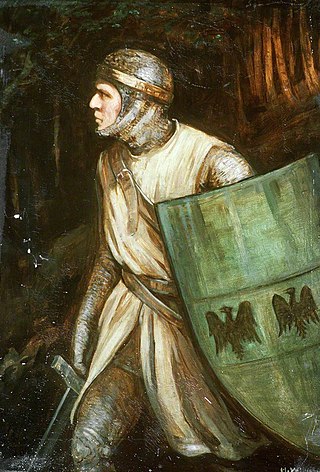
Owain ap Gruffudd was King of Gwynedd, North Wales, from 1137 until his death in 1170, succeeding his father Gruffudd ap Cynan. He was called Owain the Great and the first to be styled "Prince of Wales", and the "Prince of the Welsh". He is considered to be the most successful of all the North Welsh princes prior to his grandson, Llywelyn the Great. He became known as Owain Gwynedd to distinguish him from the contemporary king of Powys Wenwynwyn, Owain ap Gruffydd ap Maredudd, who became known as Owain Cyfeiliog.

Gruffydd ap Llywelyn was King of Gwynedd and Powys from 1039 and, after asserting his control over the entire country, claimed the title King of Wales from 1055 until his death in 1063. He was the son of Llywelyn ap Seisyll king of Gwynedd and Angharad daughter of Maredudd ab Owain, king of Deheubarth, and the great-great-grandson of Hywel Dda. Gruffydd was the first and only Welsh king to unite all of Wales albeit for a brief period. After his death, Wales was again divided into separate kingdoms.

Gruffudd ap Cynan, sometimes written as Gruffydd ap Cynan, was King of Gwynedd from 1081 until his death in 1137. In the course of a long and eventful life, he became a key figure in Welsh resistance to Norman rule.

The Kingdom of Gwynedd was a Welsh kingdom and a Roman Empire successor state that emerged in sub-Roman Britain in the 5th century during the Anglo-Saxon settlement of Britain.
In Welsh poetry, an awdl is a long poem in strict metre. Originally, an awdl could be a relatively short poem unified by its use of a single end-rhyme, using cynghanedd; such early awdlau are associated with the Cynfeirdd such as Aneirin and Taliesin as found in collections such as the Book of Taliesin, the Black Book of Carmarthen, the Hendregadredd Manuscript or The Red Book of Hergest. By the nineteenth century however it came to its modern definition as a long poem using at least two of the twenty-four recognised "official" strict forms.
Cynan ab Iago was a Welsh prince of the House of Aberffraw sometimes credited with briefly reigning as King of Gwynedd. His father, Iago ab Idwal ap Meurig, had been king before him and his son, Gruffudd, was king after him.
Adda or ADDA may refer to:
Trahaearn ap Caradog was a King of Gwynedd. Trahaearn was a son of Caradog ap Gwyn, ruler of Arwystli, a small state, on the south-western border between Gwynedd and Powys. He was born in 1044 in Arwystli, and died in 1081 in Mynydd Carn in Pembrokeshire, at the Battle of Mynydd Carn.
Iago ab Idwal ap Meurig was a Prince of Gwynedd and Powys. He was also referred to as "King of the Britons" in the Annals of Ulster.
Gruffudd Fychan II was Lord of Glyndyfrdwy and Lord of Cynllaith Owain c.1330–1369. As such, he had a claim to be hereditary Prince of Powys Fadog, and was a member of the Royal House of Mathrafal. His son, Owain Glyndwr, started the Welsh Revolt and became Prince of Wales.
A maypole is a tall wooden pole.
Gruffudd Llwyd was a Welsh language poet.
Gruffudd ab yr Ynad Coch was a Welsh court poet.
Gruffudd or Gruffydd is a Welsh name, originating in Old Welsh as a given name and today used as both a given and a surname. It is the origin of the Anglicised name Griffith[s], and was historically sometimes treated as interchangeable with the etymologically unrelated Germanic name Galfrid. The Welsh form evolved from the Common Brittonic Grippiud or Gripuid. The meaning of the name is “strong lord.”

Anwyl of Tywyn are a Welsh family who claim a patrilinear descent from Owain Gwynedd, King of Gwynedd from 1137 to 1170 and a scion of the royal House of Aberffraw. The family motto is: Eryr eryrod Eryri, which translates as "The Eagle of the Eagles of Snowdonia. The family lives in Gwynedd and speak Welsh.

Tudur ap Gruffudd (1365–1405), also known as Tudor de Glendore or Tudor Glendower, was the Lord of Gwyddelwern, a junior title of the Princely house of Powys Fadog, and was the younger brother of Owain Glyndŵr, the Welsh rebel leader crowned Prince of Wales. His father was Gruffydd Fychan II, the hereditary Prince of Powys Fadog and previous Lord of Gwyddelwern. Along with his brother, Owain Glyndŵr, Tudur was a member of the Royal House of Mathrafal.

St Cadfan's Church is situated in Tywyn in the county of Gwynedd, formerly Merionethshire, Wales.
"The Maypole" or "To a Birch Tree", known in Welsh as "I'r fedwen", "Y fedwen yn bawl haf", or "Y fedwen las anfadwallt", is a cywydd by the mid-14th century bard Gruffudd ab Adda; it is one of only three poems of his that have survived. It was formerly attributed to the pre-eminent Welsh-language poet, Dafydd ap Gwilym. The poem presents the unhappy fate of a woodland birch tree which has been chopped down and re-erected in the town of Llanidloes as a maypole, then with pathetic irony asks the tree to choose between its former existence and its present one. Dancing round a maypole was a popular recreation in medieval Welsh towns, and this poem is the first record of it. "The Maypole" has been praised by literary historians as one of the very finest of Welsh cywyddau, and was included in The Oxford Book of Welsh Verse.






